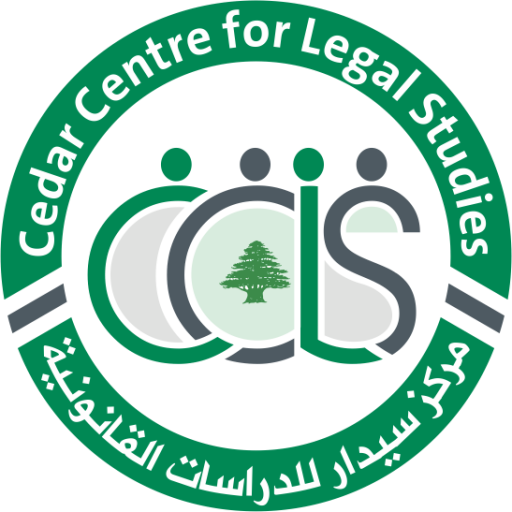Cedar Centre For Legal Studies
Activity
On the International Day in Support of Victims of Torture: Calls for Accountability in Lebanon
26/06/2025
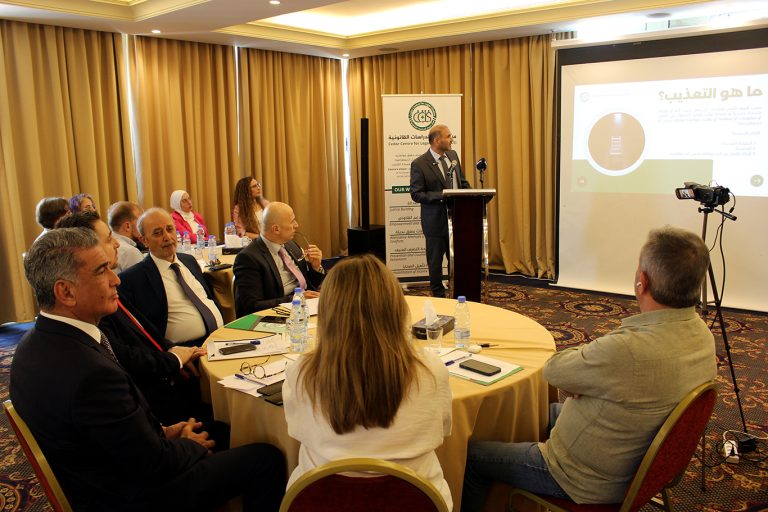
26 June 2025
Beirut – Lebanon
In the occasion of the International Day in Support of Victims of Torture, which held each year on 26 June, the Cedar Center for Legal Studies hosted a roundtable event. Participants included representatives from legal and human rights organizations, judicial and academic institutions, professional syndicates, members of parliament, as well as delegations from international organizations and UN agencies. The gathering aimed to reaffirm Lebanon’s commitment to combating torture and ensuring justice for victims.
Several prominent figures also attended the event, including Judge Fadi Al-Aridi, representing the President of the Supreme Judicial Council; former MP Misbah Al-Ahdab; former president of the Tripoli Bar Association, Mohammad Murad; and MP Elie Khoury.
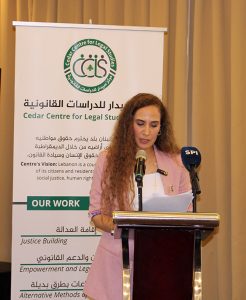
Rehabilitation Center for Torture Victims in Tripoli
The event opened with a welcoming speech by attorney Samah Issa from the Cedar Center, who emphasized that the day is not symbolic alone, but a human rights milestone reaffirming moral and legal support for torture victims. She highlighted a major achievement for Cedar centre, the launch of a rehabilitation center in Tripoli on December 2024. The center offers free, confidential medical, psychological, social, and legal services to help survivors heal and seek justice.
Amira Sukkar: No Justice for Minors Without True Protection
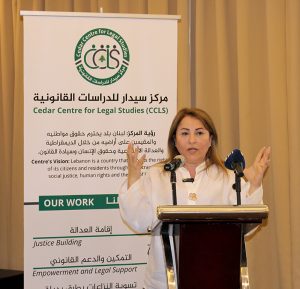
In a moving speech, Amira Sukkar, the President of the UPEL, The Union for the Protection of Juveniles in Lebanon, shared the story of a minor with mental challenges who was coerced into confessing to a crime he did not commit. She criticized the lack of child-focused procedures during interrogations and called for trained personnel, a dedicated juvenile police force, and separate legal channels for minors.
Awareness video: What Is Torture and protocol Istanbul?
The event featured an animated awareness video explaining the definition, forms, methods, and lasting effects—both mental and physical—of torture. It illustrated the long-term trauma survivors endure even after their release.
Mohammad Sablouh: The Judiciary Is Silent… We Seek Global Help
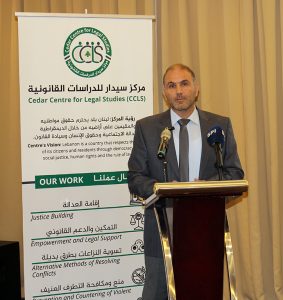
Mohammad Sablouh, Legal Director at the Cedar Center, presented documented torture cases. One involved a detainee held incommunicado for 15 days—denied contact with his family or lawyer, and stripped of visitation or communication rights. Authorities only acted under media pressure. A forensic report later revealed hearing loss, suspected finger fractures, and mobility issues, yet judicial bodies did not move on their own—revealing a lack of genuine intent to pursue justice.
Sablouh stressed the media’s critical role in pushing for accountability and added: “We turn to the UN because Lebanese courts do not protect victims, despite the 2017 anti-torture law.”
He also gave a detailed overview of the Istanbul Protocol—the internationally recognized manual for documenting torture and inhumane treatment—and outlined the need to train judges, forensic doctors, lawyers, and members of Lebanon’s torture prevention committee on its use.
He warned that weak political will, lack of training, and institutional inaction are hindering the protocol’s application in Lebanon and urged for its inclusion in official training curricula and legal proceedings.
AI Video: The Story of Bashar Abdel Saud
The media platform “Ana Hon” prepared AI-generated video recounting the story of Syrian national Bashar Abdel Saud, who died in Lebanese custody after his arrest by a security agency. The video traced his journey from fleeing war in Syria to being arrested in Lebanon and dying hours later. Human rights groups were outraged that the case was sent to military court, despite calls for a civilian judicial investigator.
Nour Hassan: Torture Destroys the Mind Before the Body
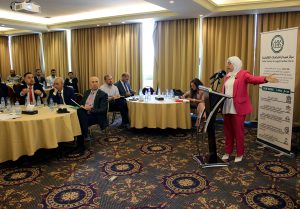
Psychologist Nour Hassan explored the psychological aftermath of torture, referencing the Istanbul Protocol. She explained less visible methods—such as white torture, threats, sexual violence, and psychological manipulation—that often lead to psychosis, PTSD, depression, and panic attacks. “Without comprehensive support,” she warned, “the psychological damage can be lifelong.”
Live Testimony: Moaz Mereeb Shares His Pain
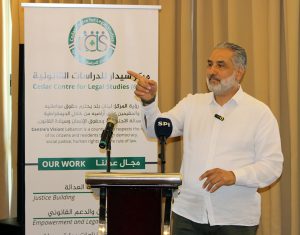
Lebanese torture survivor Moaz Mereeb shared a harrowing testimony of 19 years of imprisonment in Syrian detention centers, including Saydnaya Prison and Palestine Branch. He described brutal methods—like “the tire,” suspension, and naked interrogations—saying, “The goal was to destroy the soul, not just extract information.”
He added that his suffering didn’t end upon release—it marked the beginning of a long recovery journey. The Cedar Center accompanied him every step of the way, offering psychological, medical, and legal support and documenting his case as part of Lebanon’s broader path toward justice.
Moaz concluded by thanking the Cedar Center, saying organizations like it are “a beacon of hope for survivors seeking to turn pain into power.”
Key Recommendations and Reform Demands
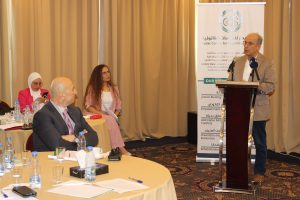
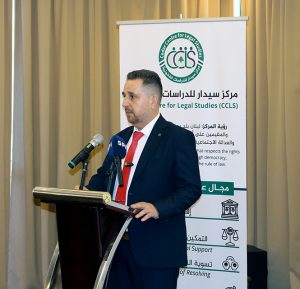
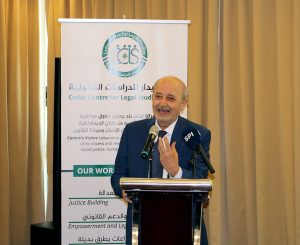
Several lawyers, MPs, and human rights advocates called for:
- Referring all torture cases to civilian judiciary
- Activating and guaranteeing the independence of Lebanon’s torture prevention committee
- Creating a national mechanism to monitor violations
- Integrating psychological support into rehabilitation processes
- Enhancing media and digital documentation—including AI—to preserve victims’ stories.
Practical Recommendations for Reform
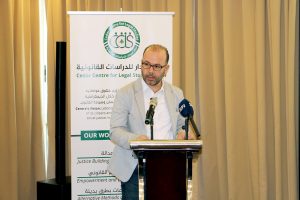
To conclude, Cedar Center Executive Director Saadeddine Shatila presented a set of practical reforms, included in a joint statement drafted with local and international organizations:
- Respect international obligations under the Convention against Torture and its Optional Protocol, and implement the recommendations issued by the UN Committee against Torture.
- Recognize the authority of the UN Committee Against Torture to receive individual complaints under Article 22 of the Convention and enhance grievance mechanisms.
- Refer all torture cases to regular courts in accordance with Article 15 of the Code of Criminal Procedure, ensuring fair and transparent trials.
- Conduct prompt, independent, effective, and impartial investigations into all complaints of torture and other ill-treatment.
- Adopt a law on the independence of the judiciary in accordance with international standards to ensure the integrity and impartiality of the judiciary, including in cases of torture and other ill-treatment.
- Publish reports from the UN Subcommittee on Prevention of Torture regarding Lebanon to promote transparency and accountability.
- Adopt the Istanbul Protocol as a mandatory reference in medical and judicial investigations, and train judges and forensic doctors on its content.
- Amend Law No. 65/2017 on the Punishment of Torture to include a more precise and comprehensive definition of the crime, abolish the statute of limitations, impose appropriately serious penalties, and restrict jurisdiction over torture cases to regular courts.
- Empower the National Human Rights Commission to perform its duties immediately by issuing executive decrees and providing adequate resources.
- Provide support and rehabilitation programs specifically for torture survivors, as well as for refugees who have been subjected to forced deportation, and ensure their access to medical, psychological, and legal services.
